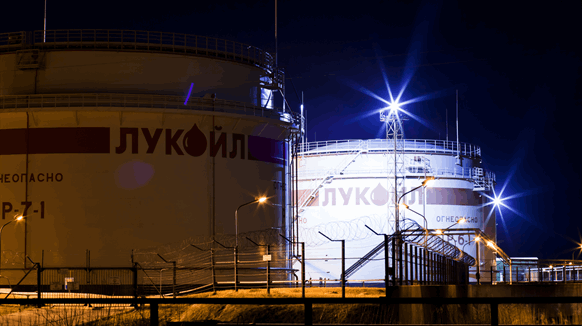
Lukoil PJSC, Russia’s second-largest oil producer, announced plans to sell international assets after being hit by US sanctions last week.
The company is has started considering bids from potential buyers, according to a statement posted on its website late on Monday. The divestment process is being conducted under a wind-down license from the US Treasury’s Office of Foreign Assets Control, which Lukoil said it could ask to be extended “to ensure uninterrupted operations of its international assets.”
Last week, President Donald Trump’s administration slapped sanctions on Russia’s two biggest oil producers – Lukoil and state-controlled Rosneft PJSC – to pressure the Kremlin to end the war in Ukraine. The oil and gas industry is a key source of tax revenues for the nation’s budget, and two producers account for just under a half of the country’s crude exports.
The goal of the White House is to make Russia’s oil trade harder, costlier and riskier, rather than stopping the flows altogether in a way that could spike global crude prices. The UK also blacklisted the two companies earlier this month.
Lukoil is the most internationally diverse of Russia’s oil giants, with upstream businesses in former Soviet countries such as Kazakstan, Uzbekistan and Azerbaijan, as well as in Egypt, the United Arab Emirates and West African nations of Ghana, Nigeria, Cameroon and Congo.
In all these projects, the Russian producer holds minority stakes, and their share in Lukoil’s total crude production last year was only 5 percent, according to the company’s annual report. International assets jointly account for around a quarter of Lukoil’s current capitalization, according to estimates from Kirill Bakhtin, senior analyst at Moscow-based BCS.
One notable exception is Iraq, where Lukoil holds 75 percent of the giant West Qurna 2 oil project. In April, the project pumped over 480,000 barrels a day, according to Interfax. Lukoil also holds 80 percent in Iraq’s Block 10 in the same area, where production is expected to reach 30,000 barrels a day this year.
The US sanctions allow transactions with the two Russian oil companies and subsidiaries in which they hold 50 percent or more until Nov. 21. Still, any payment during this wind-down period would have to be made into a blocked account, according to the general license.
Lukoil is prepared to seek an extension of the license “to ensure uninterrupted operations of its international assets,” if needed. The decision follows the “introduction of restrictive measures against the company and its subsidiaries by some states,” the producer said.
Lukoil’s international trading business is more significant than its exploration and production operations. Last year, the company bought and sold 59.6 million tons, or an average of 1.19 million barrels a day, according to its annual report. The producer’s 100 percent-owned trading arm Litasco operates from Geneva and Dubai.
The Russian producer also has a network of more than 5,300 retail fuel stations in 20 countries around the world as well as refineries in Europe. Their combined throughput last year reached 13.5 million tons, or around 270,000 barrels a day, according to the report.
Source: Bloomberg
